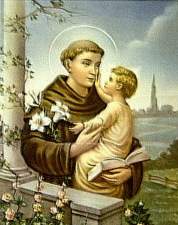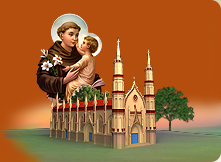|
St. Antony's Life History

 St Anthony of Padua who was born in a native of Lisbon, Portugal in 1195, received his surname from his long residence at Padua, . This city has the honour of possessing the treasure of his relics. He was born in 1195, and christened by the name of Ferdinand which he changed to that of Anthony when he entered the Order of St Francis, out of devotion to the great Patriarch of Monks, who was the titular saint of the little chapel of his Order in which he took the habit. His father was Martin De Bullones, an officer in the army of Alphonus I, surnamed el Consultador. The mother of our Saint was Mary of Tevara, one of the most accomplished of women. Both his parents were equally distinguished by their nobility and virtue. They placed their son while very young in the community of the Canons of the Cathedral of Lisbon, and from his tender years he advanced both in knowledge and devotion. At fifteen years of age he entered among the regular Canons of St Augustine near Lisbon; but being unable to bear the interruption and distraction which the visits of his friends there gave him, he desired two years after, to be sent to the Convent of the Holy Cross of the same Order at Coimbra, a hundred miles from the city. Here he lived nearly eight years in close retirement and austerity, pursuing his studies in the Sacred Scripture. At this time Don Pedro, Infant of Portugal, brought over from Morocco the relics of the five Franciscans, who had been lately crowned there with martyrdom. Ferdinand was strongly affected at the sight, and conceived an ardent desire to lay down his life for Christ. Shortly after, certain Franciscan friars came to his monastery of the Holy Cross for alms; Ferdinand at once disclosed to them his inclination to embrace their institute, thinking it a good opportunity to suffer martyrdom, but no sooner was this known among his canons, than they endeavoured to dissuade him from such a resolution; but he earnestly begged the direction of the Holy Spirit, and he received the new habit in 1221, in the little Franciscan convent dedicated to the great St Anthony, Patriarch of the Monks, near Coimbra. After having spent some time in solitude, prayer and penitential austerities, and burning with a desire for martyrdom, he obtained leave to go to Africa to preach the Gospel to the Moors. He scarcely arrived there, when God, satisfied with the sacrifice of his heart, visited him with a severe attack of illness, which obliged him to return to Spain for the restoration of his health. But by contrary winds the vessel on which he embarked was driven to Sicily and touched at Messina, where he was informed that St Francis, the holy founder of his Order, was then holding a general Chapter at Assisium. Here he offered himself to the provincials and guardians of Italy, but not one of the superiors would be troubled with him, so unpromising and sickly was his aspect. At last, a guardian in the province of Romagna, named Gratiani, took pity on him and sent him to the hermitage of Mount Paul, a little solitary convent near Bologna, where he took upon himself the duties in the kitchen and other servile work. Here Anthony never let fall one word which might show his learning, much less anything of the sublime communications of his soul with God,; but he listened to everybody, and only spoke when obliged, till the following incident made him known to the world. An assembly of the neighbouring Dominicans and Franciscan friars was held at Forli, in which the Dominicans as strangers were desired to make exhortation to the company. They all excused themselves, everyone saying that he was not prepared. Then Anthony’s guardian ordered him to speak and to say whatever the Holy Spirit should put in his mouth. The Saint begged to be excused, alleging that he had been only used to wash the dishes in the kitchen and to sweep the house. But at the insistence of the Superior, he spoke with such eloquence, erudition and unction that all were astonished. He was at that time about twenty six years old. St Anthony of Padua who was born in a native of Lisbon, Portugal in 1195, received his surname from his long residence at Padua, . This city has the honour of possessing the treasure of his relics. He was born in 1195, and christened by the name of Ferdinand which he changed to that of Anthony when he entered the Order of St Francis, out of devotion to the great Patriarch of Monks, who was the titular saint of the little chapel of his Order in which he took the habit. His father was Martin De Bullones, an officer in the army of Alphonus I, surnamed el Consultador. The mother of our Saint was Mary of Tevara, one of the most accomplished of women. Both his parents were equally distinguished by their nobility and virtue. They placed their son while very young in the community of the Canons of the Cathedral of Lisbon, and from his tender years he advanced both in knowledge and devotion. At fifteen years of age he entered among the regular Canons of St Augustine near Lisbon; but being unable to bear the interruption and distraction which the visits of his friends there gave him, he desired two years after, to be sent to the Convent of the Holy Cross of the same Order at Coimbra, a hundred miles from the city. Here he lived nearly eight years in close retirement and austerity, pursuing his studies in the Sacred Scripture. At this time Don Pedro, Infant of Portugal, brought over from Morocco the relics of the five Franciscans, who had been lately crowned there with martyrdom. Ferdinand was strongly affected at the sight, and conceived an ardent desire to lay down his life for Christ. Shortly after, certain Franciscan friars came to his monastery of the Holy Cross for alms; Ferdinand at once disclosed to them his inclination to embrace their institute, thinking it a good opportunity to suffer martyrdom, but no sooner was this known among his canons, than they endeavoured to dissuade him from such a resolution; but he earnestly begged the direction of the Holy Spirit, and he received the new habit in 1221, in the little Franciscan convent dedicated to the great St Anthony, Patriarch of the Monks, near Coimbra. After having spent some time in solitude, prayer and penitential austerities, and burning with a desire for martyrdom, he obtained leave to go to Africa to preach the Gospel to the Moors. He scarcely arrived there, when God, satisfied with the sacrifice of his heart, visited him with a severe attack of illness, which obliged him to return to Spain for the restoration of his health. But by contrary winds the vessel on which he embarked was driven to Sicily and touched at Messina, where he was informed that St Francis, the holy founder of his Order, was then holding a general Chapter at Assisium. Here he offered himself to the provincials and guardians of Italy, but not one of the superiors would be troubled with him, so unpromising and sickly was his aspect. At last, a guardian in the province of Romagna, named Gratiani, took pity on him and sent him to the hermitage of Mount Paul, a little solitary convent near Bologna, where he took upon himself the duties in the kitchen and other servile work. Here Anthony never let fall one word which might show his learning, much less anything of the sublime communications of his soul with God,; but he listened to everybody, and only spoke when obliged, till the following incident made him known to the world. An assembly of the neighbouring Dominicans and Franciscan friars was held at Forli, in which the Dominicans as strangers were desired to make exhortation to the company. They all excused themselves, everyone saying that he was not prepared. Then Anthony’s guardian ordered him to speak and to say whatever the Holy Spirit should put in his mouth. The Saint begged to be excused, alleging that he had been only used to wash the dishes in the kitchen and to sweep the house. But at the insistence of the Superior, he spoke with such eloquence, erudition and unction that all were astonished. He was at that time about twenty six years old.
St.Francis, hearing of the discovery of this hidden treasure in his Order in Anthony, sent the Saint to Vercelli, there to apply himself to the study of theology and after a short time to teach the sacred sciences. St Anthony taught divinity for some years with great applause at Bologna, Toulouse, Montpellier and Padua, and was appointed guardian at Limoges. He at length forsook the schools to apply himself wholly to the functions of a missionary preacher. This was his great success, and he built a glorious career as a preacher; he had a polite address, an easy carriage; and a very pleasing countenance; his voice was strong, clear and agreeable; he was endowed with a happy memory, and was a complete master of all the arts of persuasion. To his other advantages he added that of the most graceful action and accent, by which he knew how to get into the hearts of his hearers by seizing on their senses. His inexpressible energy, coupled with the unction with which he spoke, not to say anything of his extraordinary piety, talents and knowledge, made his eloquence most prevailing and rendered it like a torrent of fire which bore down and before it: his soul was itself all aflame before he endeavoured to kindle the fire of divine love in others. The learned admired the loftiness of his thoughts, while to the ignorant a natural simplicity rendered all his discourses no less intelligible and easy. Charity and prudence took off edges of harshness from his reprehensions, and his very reproofs were not bitter or austere, but amiable and insinuating. The most obstinate heretics and the most hardened sinners threw themselves at his feet, declaring themselves conquered. Pope Gregory IX hearing his preaching at Rome in 1227, in his surprise figuratively called him the “Ark of the Covenant” or rich spiritual Treasure. The edifying modesty of his deportment seemed to preach by every action. The frequent miracles performed by him enhanced greatly the reputation of his eminent sanctity wherever he preached.
He traveled through cities, towns and villages with an unwearied zeal, and preached in France, Spain and Italy. In Lombardy, for the protection of the oppressed people, St Anthony put his life in the hands of one of the most furious of tyrants. Ezzelino, a native of Marquisate of Treviso, but of German extraction having put himself at the head of the party of the Gibellins or Imperialists, made himself master of Verona, Padua and several other cities in Lombardy and exercised in them the most horrible tyranny during forty years. This tyrant, hearing that the citizens of Padua had revolted from him, put to death in one day twelve thousand persons of that country. The city of Verona which was the tyrant’s residence had lost most of its inhabitants, and was filled with his guards, whose terrible armour added fierceness to their savage countenances. The Saint, who feared no danger in the cause of God and his neighbour went boldly to Verona; he found the streets solitary and mournful and advancing to the palace, desired an audience with the Prince. Being introduced into his chamber, he saw him seated on a throne, surrounded by his troop of murderers, who stood armed ready to execute his bloody orders the instant they were issued. Anthony, no way dismayed, told the tyrant that his murders, sacrileges and plunders called to heaven for vengeance upon his head, and that those whom he had slain or oppressed were witness before God against him. The guard waited every moment to hear the tyrant command him to be cut to pieces. But, to their great astonishment, he descended from his throne, pale and trembling, and putting his girdle round his neck for a halter, cast himself at the feet of the humble servant of God, and with many tears, begged him to intercede with God for the pardon of his sins. The Saint lifted him up, and gave him suitable advice to do penance. Some time afterwards he sent a great present to St Anthony, which the holy man refused to accept saying that the only agreeable present which the Prince could make him would be to restore to the poor what he had unjustly taken from them.
St Anthony was now provincial of Romagna, but wishing to lead a retired and humble life, he quickly obtained from Pope Gregory IX licence to resign and also to leave the Court where His Holiness earnestly desired to detain him. He retired first to Mount Alverno, thence returned to his convent at Padua where he had formerly taught divinity and preached. After his return, he again preached the Lent there with such fruit that the whole city seemed changed by his sermons. Then it was that he put the last hand to the Latin Sermons, which we have, though not as he diversified them according to circumstances and spoke as the ardour of his soul directed him. His sermons now published are no more than general heads or commonplaces, destitute of the ornaments and flowers which he added in speaking.
When Lent was over, St Anthony being much spent with labour and his penitential life, finding also his health and strength declining, very fast under an inward decay, retired out of town, to a solitary place called Campietro or “Field of Peter” there to attend solely to himself and God; for he knew that his earthly pilgrimage was drawing to an end. He took with him into his solitude two companions, men of great virtue. His distemper increasing very much upon him, he desired to be carried back to his convent in Padua; but the crowds of people pressing to kiss the hem of his habit were so great and so troublesome that he stopped in the suburb and was laid in the Chamber of the director of the nuns of Arcela, where having received the rites of the Church with many tears, he recited the seven penitential psalms and a hymn in honour of the Blessed Virgin “O Glorious Domina” till he gave up his happy soul to Him who had created it for His own glory, on the 13th of June 1231, being only 36 years old, of which he had lived ten in the Order of St. Francis. At the first news of his departure, the children ran about the streets crying out, “The Saint is dead”.
Innumerable miracles testified to his sanctity, and he was immediately canonized by Pope Gregory IX in 1232 who’s Bull was dated at Spoletto. The Pope had been previously acquainted with the Saint, and was a great admirer of his virtues. Thirty-two years after his death, a stately church was built in Padua for his Order, and his remains were translated into it. The flesh was all consumed except the tongue, which was found incorrupt, red, and as fresh as it was whilst he was living. St Bonaventure, who was then General of the Order and present at this ceremony took it into his hands, and bathing it with tears and kissing it with great devotion said: “O Blessed tongue that didst always praise God, and has been the cause that an infinite number learned to praise Him; now it appears how precious thou art before Him who framed thee to be employed in so excellent and high a function”.
The tongue is kept in the same church in a beautiful case. This is at present a great and famous house of conventual Franciscan friars which often furnishes the University, and which is certainly ranked among the best in Europe, with able professors. The sepulchral monument of the Saint in the church in exceedingly rich and magnificent, and the bassorelievo with which it is adorned is a masterpiece of art. The costly lamps which hang before it are the several presents of many cities. The Portuguese likewise honour him with singular veneration.
|

